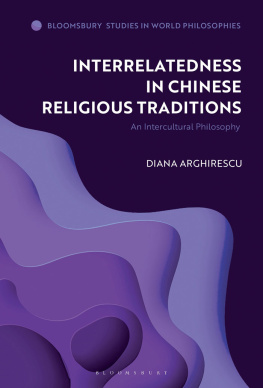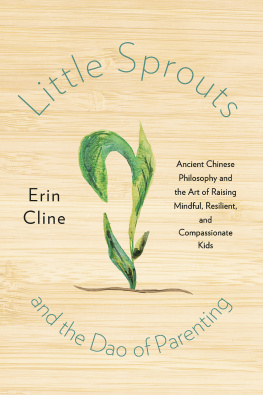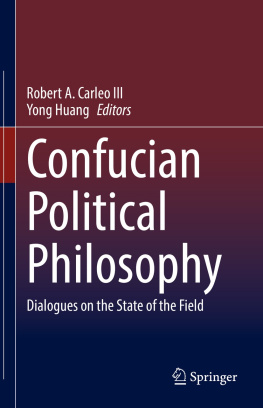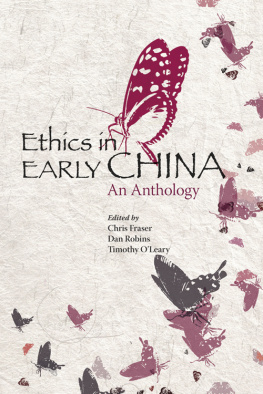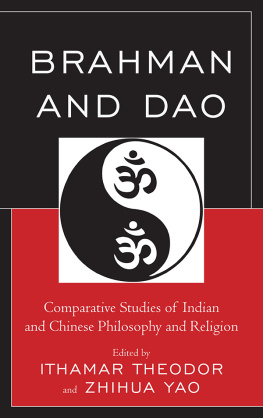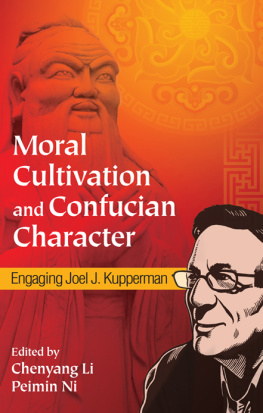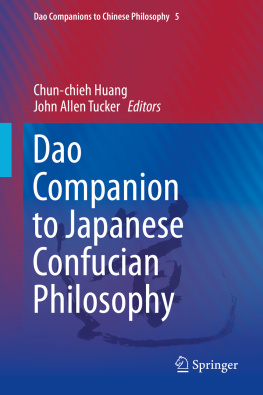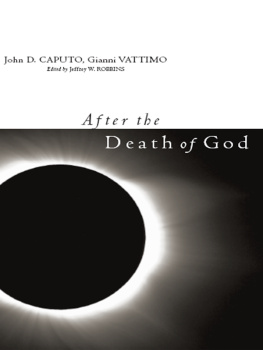FAMILIES OF VIRTUE
ERIN M. CLINE
FAMILIES OF VIRTUE
Confucian and Western Views on Childhood Development
Columbia University Press / New York
Columbia University Press
Publishers Since 1893
New York Chichester, West Sussex
cup.columbia.edu
Copyright 2015 Columbia University Press
All rights reserved
E-ISBN 978-0-231-53904-3
Library of Congress Cataloging-in-Publication Data
Cline, Erin M.
Families of virtue : Confucian and Western views on childhood development / Erin M. Cline.
pages cm
Includes bibliographical references and index.
ISBN 978-0-231-17154-0 (cloth : alk.paper) ISBN 978-0-231-17155-7 (pbk. : alk. paper)
ISBN 978-0-231-53904-3 (ebook)
1. Confucian ethics. 2. Moral developmentChinaPhilosophy. 3. Parent and childChinaPhilosophy. 4. Filial pietyChinaPhilosophy. 5. Philosophy, Confucian. I. Title.
BJ1289.3.C55 2015
170.83'0951dc23
2014023674
A Columbia University Press E-book.
CUP would be pleased to hear about your reading experience with this e-book at .
Cover design: Mary Ann Smith
Cover image: Masterfile
References to websites (URLs) were accurate at the time of writing. Neither the author nor Columbia University Press is responsible for URLs that may have expired or changed since the manuscript was prepared.
For my parents, who provided the warmth of three spring seasons to my tender blade of grass,
For my husband, Michaelthe yin to my yang and the yang to my yin, and for our children, Patrick and Bridget, who have surely taught me more than I could ever hope to teach them
CONTENTS



I GRATEFULLY ACKNOWLEDGE the help of many colleagues and friends in the writing of this book. I am especially grateful to those who read and commented on the entire manuscript, including three reviewers for Columbia University Press. I owe a special debt of gratitude to P. J. Ivanhoe for encouraging me to write this book in the first place and for reading and commenting on numerous drafts. In addition to his indispensable feedback at every stage of the project, I am grateful for the friendship of P. J. and his wife, Hong, and for their inspiring model of loving, supportive parenting. I also owe special thanks to Bryan Van Norden, who offered detailed comments and suggestions on the manuscript, which resulted in a much stronger book. I am also grateful for his encouragement and for the excellent model of careful scholarship that his work has provided over the years. I am also particularly grateful to Michael Puett, whom I admire in more ways that I can enumerate here and whose suggestions and encouragement were immensely helpful.
I presented material from this book in many different forums over the years, and I am grateful to audiences at the conference on Confucian and Liberal Perspectives on Family, State, and Civil Society at the City University of Hong Kong, the Oregon Humanities Center, and the annual meetings of the American Philosophical Association and the American Academy of Religion for helpful comments and questions, which influenced this work. I also want to thank those who read parts of the manuscript and/or offered helpful feedback on the various philosophical, textual, and historical issues connected with this project, including Eric Hutton, Mark Unno, Pauline Lee, Leigh Jenco, Justin Tiwald, Hagop Sarkissian, and Chenyang Li.
I am grateful for the generous support of Georgetown University, the Oregon Humanities Center, and the University of Oregon for grants and fellowships that provided the time and the resources essential to the completion of this project. I am particularly thankful to the Theology Department at Georgetown University and my wonderful department chair, Chrisopher Steck, S.J., for providing the support that made this book possible. I am fortunate to have a truly wonderful group of colleagues and friends at Georgetown who support and encourage me in numerous ways. While I cannot mention all of them here, I am particularly grateful to Jonathan Ray and Daniel Madigan, S.J., for their interest in this project and for their encouragement. I also want to thank Kevin OBrien, S.J., for kindling in me a devotion to the Ignatian tradition and for patient, astute, and generous guidance and encouragement in all things. I am truly grateful to my friends in the Society of Jesus for showing me meaning and beauty in another kind of family.
I want to express my appreciation to the entire editorial team at Columbia University Press. I am particularly grateful to Wendy Lochner, my editor, for her advice and encouragement and to Christine Dunbar for her invaluable assistance.
Most importantly, I am grateful to my family for showing me the meaning of all the things I write about in this book. My parents, my brother, Kelly, and his wife, Jamie, and their children have been a constant source of support and love. My husband, Michaelmy perfect complement in all endeavorsread every draft and provided invaluable feedback and encouragement and helped me find the right publisher. He also cared for our children for many hours while I worked on this book. Our children, Patrick and Bridget, inspired me with firsthand experiences of many of the things I write about in these pages and most of all with their spontaneous outpourings of love and affection.
T HERE IS CONSIDERABLE evidence that parentchild relationships during infancy and early childhood serve a unique and irreplaceable role in moral development. This has been borne out in experiments showing that the capacity for lively expressions of joy or anger in six-month-old infants depends upon their attachment to supportive, responsive parents during the early weeks and months of life, as well as in controlled studies revealing that children whose parents are supportive and responsive in the earliest period of life exhibit an increased capacity for sympathy as preschoolers. Despite such evidence, philosophers have given little attention to the role of the family in moral cultivation during these formative years. This book examines the reasoning on this question by a range of philosophers and scientistsfrom ancient Chinese philosophers, to Aristotle and Locke, to contemporary care ethicists and attachment theoristsand argues for the importance of understanding the unique and irreplaceable role of parentchild relationships in early moral development, not only for contemporary ethics and political philosophy, but for our attempts to address contemporary moral problems through the crafting of public policy.
Historically, while the views of many thinkers on these issues fall short of compelling, distinctive and fascinating theories and ideas concerning the specific nature of parentchild relationships during infancy and early childhood and their role in moral development are found in the work of some of the most influential ancient Chinese philosophers, specifically those associated with the Confucian tradition. They argue that the general ethical sensibilities we begin to develop during infancy and early childhood are the basis for nearly every virtue and that parentchild relationships are the primary context within which this early moral cultivation occurs. They describe how and why parentchild relationships provide a foundation for our moral development, and they further contend that early childhood development within the family is not simply a private or purely ethical matter; it has a direct and observable impact on the quality of a society and thus deserves the attention of political philosophers and policy makers.







